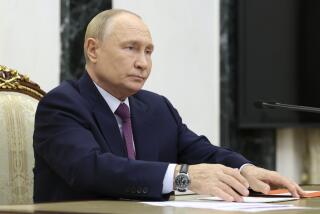Gorbachev’s Shift Revives Controversial ‘Star Wars’ : Arms: But it is uncertain whether Soviets will move toward missile defenses or just ‘consider’ the idea.
- Share via
WASHINGTON — By agreeing to consider proposals for non-nuclear antimissile defense systems, Soviet President Mikhail S. Gorbachev has breathed new life into the controversial “Star Wars” program at a time when it is particularly vulnerable to post-Cold War defense cuts.
The startling move, which came last week in the Soviet response to President Bush’s reductions in the U.S. nuclear arsenal, reverses Moscow’s decades-old opposition to defense systems beyond the token force permitted under the 1972 Anti-Ballistic Missile Treaty.
But it is not certain whether the Soviets actually are willing to move seriously toward strategic missile defenses, or are merely willing to “consider” the idea before rejecting it. U.S. officials and private arms-control experts disagree strongly on the point.
The Soviets have long opposed the “Star Wars” concept, in part because U.S. research and technology in the field is more advanced. If successfully deployed by the United States, such a missile-defense system could decrease the effectiveness of the Soviets’ offensive arsenal and put them at a nuclear disadvantage.
If Moscow drops its resistance to missile defenses, the United States and Soviet Union could effectively dissolve the 1972 ABM treaty, long considered the centerpiece of superpower arms control, and begin to cooperate in the development of a missile shield.
“It’s very, very refreshing to hear ‘yes’ ” about strategic missile defenses, said Henry F. Cooper, who negotiated with the Soviets on the issue in Geneva and who now runs the Pentagon’s Strategic Defense Initiative project, as “Star Wars” is formally called.
But longstanding opponents of “Star Wars” stress that Gorbachev did not say yes. The private Arms Control Assn., for example, dismissed Gorbachev’s words as “a tactical move.”
“They may be prepared to enter talks and ‘consider proposals’ and then gum them to death, as they have before on space defenses,” said Jack Mendelsohn, the organization’s deputy director. “Or they may only be interested in defenses against tactical (short-range) missiles, but I don’t think they are serious about building strategic defenses” against intercontinental missiles.
Several motives were suggested to explain the Gorbachev shift. These range from a new sense of vulnerability by Moscow, because of the loss of the Baltic states and other separatist republics where early-warning radar systems are located, to a new faith in the good intentions of the United States.
Other explanations are that Moscow hopes to “buy into” the U.S. system to ensure that it is limited to guarding against accidental or third-country attacks and that it hopes to share U.S. antimissile technology, which former President Ronald Reagan once offered but which the Bush Administration has withdrawn.
Previously, Gorbachev spurned Bush’s appeals to drop his opposition to missile defenses in an age when increasing numbers of Third World nations have nuclear weapons and ballistic missiles.
“We will never agree to helping with our own hands to wreck the ABM treaty,” Gorbachev once said. “For us, this is a matter of principle, of our national security.” He argued that the deployment of defenses would destabilize a world grown accustomed to a mutual standoff in offensive nuclear missiles.
Besides fearing disruption of the nuclear balance, the Soviets and U.S. lawmakers critical of the system expressed concern that such a shield could embolden the United States to launch a first strike on the Soviet Union with impunity.
But last Saturday, in response to Bush, Gorbachev said that “we are prepared to consider proposals from the United States of America on non-nuclear, antimissile defense systems.”
“Any way you slice it,” one knowledgeable U.S. official said, “Gorbachev is now saying for the first time that Moscow is willing to consider altering the ABM regime. It’s a significant shift on their part, and it’s bound to help the program in Congress.”
The program before Congress is a scaled-down version of the grand “Astrodome” concept put forward in 1983 by Reagan. It would begin with ground-based interceptors that would destroy enemy warheads by crashing into them. Detection systems would be contained in orbiting satellites. From a single site, the system would grow to five or six more ground sites, with space-based interceptor systems later. The program would cost an estimated $32 billion and promise protection for the entire United States against limited or accidental launching of up to 200 warheads.
Pressure to reduce or reassess this and other new multibillion-dollar projects has intensified in Congress since the disintegration of the Soviet Union in the aftermath of August’s failed right-wing coup.
More to Read
Sign up for Essential California
The most important California stories and recommendations in your inbox every morning.
You may occasionally receive promotional content from the Los Angeles Times.













